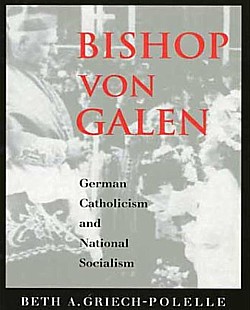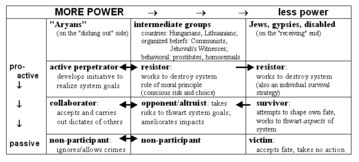Analysis of 1941 Sermons
(back to top)
Von Galenís public responses towards the effects of the Nazi regime in
the dioceses of Münster are found in his sermons issued on July 13,
July 20, and August 3, 1941. Each sermon varies slightly in content, in
response to what was taking place that week. He used the first week to
build a basis for the rest of the sermons, however.
Von Galenís first famous sermon on July 13, 1941 is outspoken against
outrages of the National Socialists against church officials. He cites
at great length the lack of legality of imprisonment of clergy and their
sentencing without trial. He also denounces the governmentís expulsion
of monastic orders from monasteries, and the use of monasteries as locations
for government administration. He cites examples of not only of church
officials and laymen within the catholic faith but also touches on a protestant
minister who is imprisoned, and thus says that, "I am not talking
about a matter of purely Catholic concern but about a matter of Christian
concern, indeed of general and human and nation concern (Griech-Polelle,
176)." While he talks at length about these things affecting Christians
in his dioceses, he does not mention the Jews who have been exiled. Even
though he is outraged by the things he does mention, he does not call
for action from his congregation, but encourages people to demand justice
in the cases he submits. It is not a call to action, but a call to look
critically at the situation. He still includes a prayer at the end for
the country and its struggle, and for Hitler, to mention a nationalistic
tone. His tone does not change much a week later.
The second famous sermon by von Galen, on July 20, 1941, is very similar
to the first sermon. It also denounces the seizure and use of monasteries
and nunneries by the government and the lack of judicial due process for
imprisoned constituents and clergy, though it adds a denunciation of the
educational system in Germany, saying that it doesnít respect Christian
values. In reference to history books, he says,
You will be appalled to see how their books, in complete disregard
of historical truth, seek to fill inexperienced children with mistrust
of Christianity and the Church, indeed with hatred of the Christian
faith, (Griech-Polelle, 184)
He accurately points out the propaganda, and again he calls for passive
resistance. This time he does ask his congregation to take a little more
active stand, however. He recommends praying for those oppressing the
Catholics, but also tells the people to teach their children Christian
morals and ethics in the home, which contradicts what they where learning
in school. He is effective in making the Catholic community look like
the victims, although again he does not even mention Jews. He ends with
a prayer for the nation and Hitler. This trend of nationalism will not
last, though.
In his third sermon, on August 3, 1941, von Galen continues his previous
outrage over the injustices brought upon Catholics, but his focus quickly
changes to a more gruesome topic. He vehemently denounces the state-sponsored
euthanasia which is taking place, saying that it goes against Christian
values. He tells a story about a paralyzed WWI war hero who was taken
away from the hospital and killed because he was no longer productive
to society. He appeals to the emotions of his congregation in talking
about the love that that man's family still had for him. He then appeals
to those who had family in the military by talking about the grandson
of the family who was on the front lines at the time, who may never see
him again, and if he suffers severe injury, may meet the same fate (Griech-Polelle,
191-192). His sermon reaches a fever pitch, and he even says, "Rather
die than sin" (Griech-Polelle, 195). But in the lines immediately
following he adds, "That in prayer and sincere penitence we should
beg that Godís forgiveness and mercy may descend upon us, upon our city,
our country, and our beloved German people." Rather than instigate
rebellion, he recommends prayer and devotion over outrage. He once again
does not mention the Jews. At the end of this sermon he does not mention
anything about the state or its leader. National law at this point had
certainly gone against Christian law, and it only seems appropriate that
he not endorse it further. |

